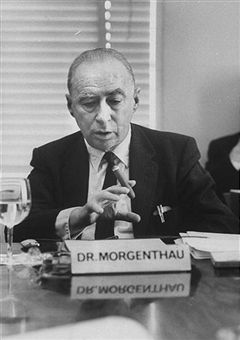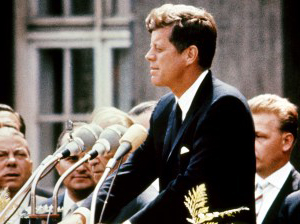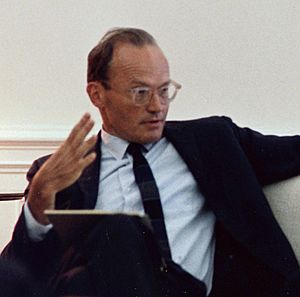Hans Morgenthau facts for kids
Hans Joachim Morgenthau (born February 17, 1904 – died July 19, 1980) was a German-American expert in law and political science. He was a very important person in the 20th century for studying international relations. This means he studied how different countries interact with each other.
Morgenthau's ideas are part of a way of thinking called realism in international relations. Realism focuses on how countries use their power. He is seen as one of the most important realists after World War II. Morgenthau greatly helped shape how we understand how countries deal with each other and international law.
His famous book, Politics Among Nations, first came out in 1948. It was updated many times and was used as a textbook in universities across the U.S. Morgenthau believed that power and a country's "national interest" were very important. However, his book's subtitle, "the struggle for power and peace," shows he also cared about how rules and good behavior could limit power.
Morgenthau wrote many articles about global politics and U.S. foreign policy for popular magazines. He knew and wrote to many smart people of his time, like Reinhold Niebuhr and Hannah Arendt. Early in the Cold War, he advised the U.S. Department of State. He advised them again during the Kennedy and Johnson presidencies. However, he was fired by President Johnson for speaking out against the Vietnam War. For most of his life, Morgenthau was respected as an expert on U.S. foreign policy.
Contents
Early Life and Education
Hans Morgenthau was born into a Jewish family in Coburg, Germany, in 1904. He went to a school called the Casimirianum there. After that, he studied at universities in Berlin, Frankfurt, and Munich.
He earned his doctorate degree in 1929. His main paper was about how international courts work. He then did more studies in Geneva, Switzerland.
Career and Moving to America
Morgenthau worked as a lawyer and teacher in Frankfurt, Germany. But he moved to the United States in 1937, after spending some years in Switzerland and Spain. One of his first jobs in the U.S. was teaching night classes at Brooklyn College.
From 1939 to 1943, Morgenthau taught in Kansas City. He then became a professor at the University of Chicago until 1973. After that, he taught at the City University of New York (CUNY). He was chosen to be a member of important groups like the American Academy of Arts and Sciences.
Later Life and Passing
On October 8, 1979, Morgenthau was on a plane that crashed while landing in Athens, Greece. Luckily, he survived.
Hans Morgenthau died on July 19, 1980, in New York. He was 76 years old. He is buried in a cemetery in New York.
Ideas on International Relations: Realism
Hans Morgenthau is known as one of the "founding fathers" of the realist school of thought in the 20th century. This idea says that countries are the most important players in how the world works. It also says that the main thing to study is power.
Morgenthau believed that a country's "national interest" was very important. In his book Politics Among Nations, he wrote that understanding politics means looking at "interest defined in terms of power." This means countries act to gain or keep power for themselves.
His ideas are sometimes called "classical realism." This is different from "structural realism" by Kenneth Waltz. Morgenthau's realism also included ideas about right and wrong, even if he didn't always say so directly. Later in his life, he wanted international control over nuclear weapons. He also strongly disagreed with the U.S. being involved in the Vietnam War.
Six Principles of Political Realism
Starting with the second edition of Politics Among Nations, Morgenthau listed "Six Principles of Political Realism." These principles help explain his ideas:
- Laws of Human Nature: Political realism believes that politics, like society, follows rules based on human nature.
- Interest Defined as Power: The main guide for political realism is the idea of "interest defined as power." This helps make sense of politics. Realism doesn't focus on what leaders personally want or believe. A good foreign policy tries to lower risks and get the most benefits.
- Changing Interests: Realism understands that what "interest defined as power" means can change depending on the time and culture. It's not a fixed idea.
- Morality and Action: Political realism knows that political actions have moral importance. It also sees the difficulty between doing what's right and doing what's successful in politics. Realism says that general moral rules must be used carefully, considering the specific situation. They can't just be applied to countries in a simple way.
- No Universal Morality: Political realism does not say that one country's moral goals are the same as the moral rules for the whole world.
- Politics is Unique: The political realist believes that politics is its own special area. A leader asks, "How does this decision affect the country's power and interests?" Realism understands that people are complex. A political realist must show how a country's interests are different from just moral or legal viewpoints.
Morgenthau thought that good diplomacy, using these principles, could lead to stability. This would happen through a "balance of power." He wrote that a balance of power is not only necessary but also helps keep peace among independent nations.
However, he also noted that countries trying to gain power don't aim for an equal balance. They actually aim to have more power for themselves. This is because it's hard to know exactly how strong other countries are. So, countries try to get as much power as they can to be as safe as possible.
Work on American Foreign Policy
In the 1950s, Morgenthau led a center at the University of Chicago that studied American foreign and military policy. He worked to improve the U.S. government's knowledge of China. This was important after many China experts had been wrongly criticized during the Second Red Scare.
Views on the "Dual State"
In 1955, Morgenthau wrote about a "dual state" in the United States. He said there was a public, democratic government with elected leaders. But he also mentioned a hidden national security group that watched and controlled the public government. Some people say this was the start of the idea of a "deep state."
Speaking Out Against the Vietnam War
Morgenthau supported the Roosevelt and Truman governments. When Eisenhower became president, Morgenthau wrote many articles for newspapers and magazines. By 1961, he was advising the Kennedy administration.
After Johnson became president, Morgenthau spoke out much more against the U.S. involvement in the Vietnam War. Because of this, he was removed as an advisor in 1965. He argued with Johnson's advisors, McGeorge Bundy and Walt Rostow. Morgenthau believed the Vietnam War was mainly a civil war and not very important globally. His strong opinions brought him a lot of public attention.
On June 21, 1965, Morgenthau debated Bundy live on TV. Bundy said Morgenthau was too negative. Morgenthau replied that even if he was wrong about one thing, it didn't mean he was wrong about Vietnam.
Later Years and Nuclear Weapons
Starting in 1960, Morgenthau became very worried about nuclear weapons. He thought a nuclear war would be a terrible disaster. He said that nuclear weapons changed international relations in a way that had never happened before. While he used to focus on how history continued, nuclear weapons made him think about how things could suddenly end.
After 1965, Morgenthau became a key voice in discussions about "just war theory" in the nuclear age. This theory looks at when it is morally right to go to war.
His book Truth and Power, published in 1970, collected his essays from the 1960s. These essays covered foreign policy, including Vietnam, and U.S. domestic politics, like the civil rights movement. Morgenthau dedicated the book to Hans Kelsen, another important legal scholar.
Morgenthau wrote many book reviews throughout his career. He also commented on the Pentagon Papers, which were secret government documents about the Vietnam War.
Like Hannah Arendt, Morgenthau supported the country of Israel. Both of them visited Israel each year to help its new academic community. Morgenthau was also interested in the wider Middle East and topics like the politics of oil. He also wrote about how democracy works when faced with big problems.
Selected Works
- Scientific Man versus Power Politics (1946)
- Politics Among Nations: The Struggle for Power and Peace (1948, and later editions)
- In Defense of the National Interest (1951)
- The Purpose of American Politics (1960)
- Crossroad Papers: A Look Into the American Future (editor) (1965)
- Truth and Power: Essays of a Decade, 1960–70 (1970)
- Essays on Lincoln's Faith and Politics. (1983)
- The Concept of the Political (2012; originally 1933)
For a full list of Morgenthau's writings, you can visit "The Hans J. Morgenthau Page" at Google Sites.
Images for kids
See also
 In Spanish: Hans Morgenthau para niños
In Spanish: Hans Morgenthau para niños
- Morgenthau Lectures by the Carnegie Council
- E. H. Carr
- Kenneth W. Thompson
- Stephen Walt
- Committee on International Relations at the University of Chicago
 | Jewel Prestage |
 | Ella Baker |
 | Fannie Lou Hamer |





